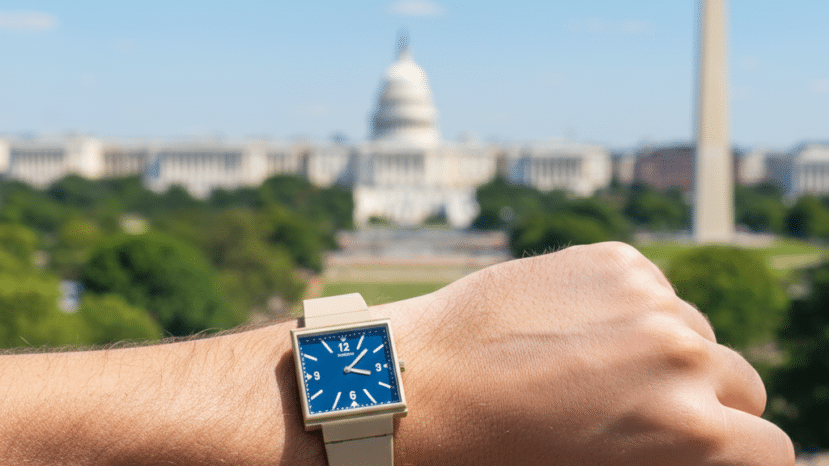Swatch challenges Washington with its “39%” watch in September 2025

Swatch surprises by launching a limited edition that directly displays the famous 39% US customs duty on Swiss watches. Sold only in Switzerland, this timepiece is as much a marketing gesture as a political act. It could disappear from the market as soon as Washington relaxes its tariff stance.
A watch edited to denounce a tax
The Swatch Group has chosen irony to respond to the 39% tariffs imposed by the USA on Swiss watch imports. Its new watch features a symbolic inversion of the numbers 3 and 9, writ large on the back, accompanied by a percentage. This exclusive model will only be distributed in Switzerland, underlining the clearly provocative nature of the gesture.
Priced at CHF 139, the “39%” model is both accessible and incisive. Availability will depend on the duration of the trade dispute: if Washington changes its policy, production will cease immediately. This ephemeral watch illustrates how watch design can be transformed into a diplomatic message.
Raymond Weil joins the fightback
Faced with Swatch‘s media release, independent watchmaker Raymond Weil chose an equally symbolic response. It proposed a limited series of 39 pieces, equipped with a 39 mm dial, as a reminder of the contested tax. The approach adopts the same logic: draw attention using obvious numerical codes.
However, Raymond Weil’s offer was different: instead of adding 39%, the company granted a 39% discount. The final price of the watch is CHF 1,575, a way of transforming the weight of a tax into a customer benefit. The brand’s General Manager even described the initiative as a “positive” gesture in a tense environment.
A heated commercial dispute
Since April 2023, Washington has applied a 39% tariff to Swiss watch imports. The official aim of this measure is to protect the use of the “Made in Switzerland” label. But in reality, it severely penalizes Swiss brands, even though the American market accounts for 17% of their exports.
Observers fear that this tax will weaken players of varying sizes, from industrial giants like Swatch Group to independent family-run companies. The cost of the duty has a direct impact on competitiveness, as few consumers are willing to bear such a surcharge in the final price. This puts the Swiss watchmaking industry at the forefront of protectionist policies.
In this tense climate, limited editions are as much a means of communication as of sales. They can be used to relay a message, while consolidating goodwill with local and international customers. Swatch’s choice is a perfect illustration of this hybrid strategy between marketing and diplomacy.
“This ad is to be understood as a positive provocation, a nod to the current situation,” explained a group spokesperson on September 11, 2025.
Swiss diplomacy in action
Beyond brand initiatives, the issue is eminently political. At the beginning of September, Swiss Economy Minister Guy Parmelin travelled to Washington to meet his American counterparts. He described the discussions as “constructive”, although details and prospects were not made public.
The Swiss authorities are seeking to demonstrate that this surtax is detrimental to a strategic sector that generates billions in exports. Watchmaking embodies part of the Swiss identity, both culturally and economically. In this sense, negotiations must strike a balance between respect for labels and free trade.
“Instead of adding 39%, we’ll deduct 39% from the price instead,” said Raymond Weil CEO Elie Bernheim on September 11, 2025.
Economic outlook and pressures
If no breakthrough is achieved in the next few weeks, there is a real risk that tariffs will remain in place. Maintaining decent margins without losing the U.S. market is a complex commercial challenge for large groups and family-run businesses alike. This is why the use of symbolic limited-edition products reflects a need to attract media and political attention.
This tension could help strengthen Swiss lobbying in bilateral relations. Watch brands traditionally enjoy an important aura in Swiss economic diplomacy. The use of symbolic messages, dressed up creatively, serves to keep the issue on Washington’s agenda.
In the longer term, the sector is hoping for a relaxation or elimination of the 39%. Otherwise, the delicate balance between competitiveness, image and profitability could be threatened. American retailers themselves could turn away from certain collections for lack of attractive prices.
The next few diplomatic meetings will show whether the Swiss strategy of combining original commercial actions with discreet political discussions will bear fruit. As for Swiss consumers, they’re already rushing out to buy these models, which have the scent of a political manifesto.





No comments
Post a comment
Always participate in accordance with the law and with respect for others.